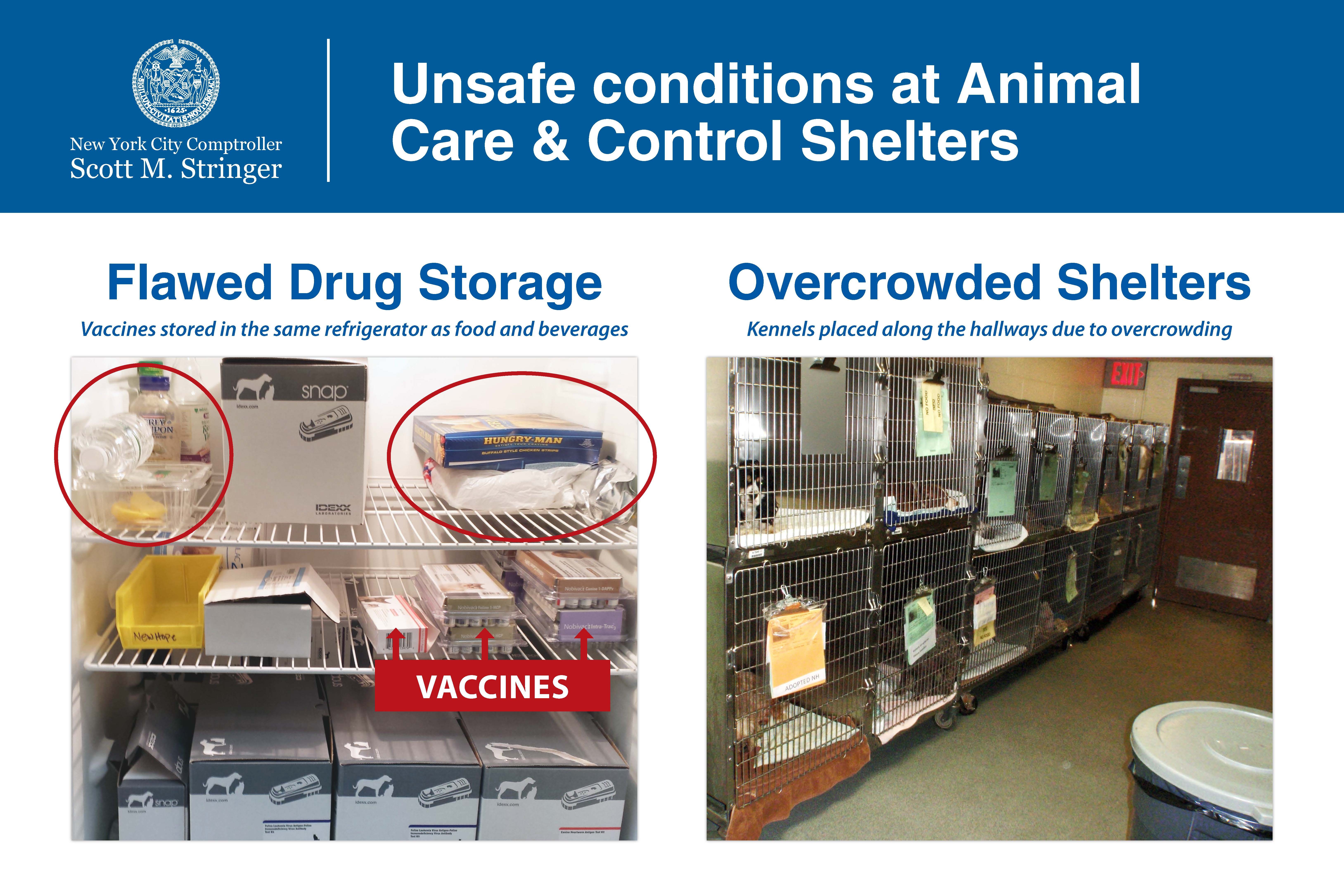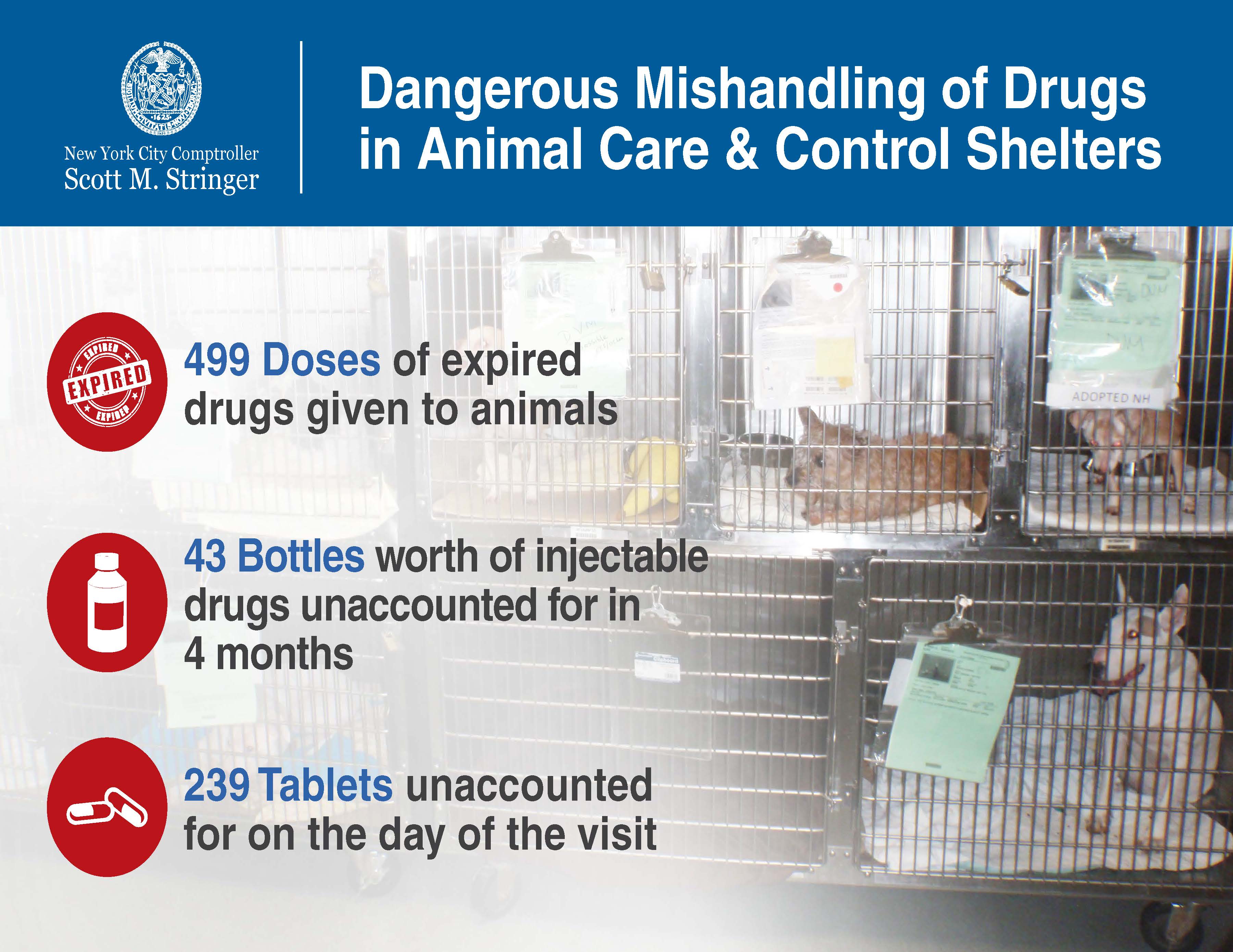Comptroller Stringer Audit: Improper Handling Of Drugs And Poor Shelter Conditions At Animal Care & Control
Expired medications distributed to animals, vaccines refrigerated with staff lunches
New York, NY – Animal Care & Control (AC&C) of New York City does not ensure the safety of drugs and vaccines it administers, fails to track them efficiently, operates an overcrowded shelter in Manhattan, and potentially unsafe facilities, according to an audit released today by New York City Comptroller Scott Stringer.
“Animal Care & Control is running an operation that could make your stomach turn,” Comptroller Stringer said. “We found expired drugs, harmful conditions, and vaccines stored next to frozen remains. How we treat our most vulnerable creatures is a reflection of our decency as a society, and AC&C is failing in that important responsibility.”
AC&C, a non-profit corporation, has a 5-year, $51.9 million contract with the Department of Health & Mental Hygiene (DOHMH) to provide shelter, examine, test, treat, spay, neuter and assure the humane care and disposition of animals in shelters located in Manhattan, Brooklyn and Staten Island, along with drop-off centers in Queens and the Bronx. The audit examined four-months (December 2013 through March 2014) of controlled substance logs, and shelter conditions were observed on several occasions between March and November 2014. In addition, auditors examined AC&C’s financial operations for FY 2013 and sought to determine if it had adequate controls to ensure proper operational and financial accountability.
Auditors found that animals’ health was put at risk by AC&C’s failure to oversee controlled substances in all three shelters. A review of logs found 499 occasions in which expired drugs were given to animals. Auditors found that the Manhattan shelter distributed 489 expired tablets of Tramadol, an opioid; in the Brooklyn facility, expired doses of Diazepam, a form of valium, were given to at least three animals. Additionally, 92 bottles of expired controlled substances-some as old as 13 years-had not been removed from the premises.
The Comptroller’s audit also found that AC&C:
- Failed to effectively oversee controlled substances: Lacking a computerized inventory system, AC&C shelters generally relied on only one person at each shelter to complete the request, receipt and recording of their controlled substances inventory — which included opioids, sedatives, and a potentially deadly barbiturate. During the four-month review period, auditors found discrepancies in records involving 224 bottles of injectable, controlled substances. AC&C could not account for 239 tablets and the equivalent of 43 bottles of injectable liquids of controlled substances across all three shelter locations in Manhattan, Brooklyn and Staten Island.
- Stored vaccines in food refrigerators and alongside animal remains: Auditors found vaccines and employee lunches stored together at the Brooklyn shelter, despite Centers for Disease Control and Prevention guidelines that vaccines should never be stored in the same refrigerator as food or beverages. At the Manhattan shelter, auditors found vaccines stored in a freezer alongside animal remains.
- Allowed poor shelter conditions to exist, until auditors notified AC&C and DOHMH officials: At the Brooklyn shelter, poor ventilation contributed to a strong gas odor, while a shared climate control system between isolation rooms for sick animals and rooms with healthy animals increased the risk of spreading contagious diseases. The Manhattan shelter had kennels lined up along the hallways of the facility due to overcrowding. Although there was a large city-owned space next door, AC&C used this space for storage, instead of converting the area into usable space for animals. At the Staten Island shelter, auditors found a defective fire alarm as well as peeling paint above dog kennels and feeding areas.
- Weak and ineffective financial controls: Inadequate policies and procedures resulted in nearly $12,000 in credit card expenses that lacked adequate documentation as business expenses. Late payments incurred $18,000 in late fees and interest in FY 2013. AC&C also failed to provide a cost-benefit analysis of its planned move from office headquarters in Lower Manhattan, for which it has paid more than $221,000 in rental expenses annually since 2012.
“Our audit indicates a lack of effective management and financial and operational negligence. As a result, questionable conditions put the well-being of the animal population at risk,” Stringer said. “Our City can and must do a better job of treating homeless animals with compassion and respect.”
The audit set forth 18 recommendations to both Animal Care & Control and the Department of Health and Mental Hygiene, the agency responsible for AC&C’s contract compliance. These recommendations include:
- Implementing a computerized inventory system to accurately track controlled substances;
- Establishing policies to ensure controlled substances are handled in accordance with DEA guidelines;
- Ensure that expenses are documented and that accurate purchasing documents are provided; and
- Conduct a cost benefit feasibility study to determine if moving headquarters is appropriate.
The DOHMH and AC&C fully agreed with the majority of the recommendations in their response to the audit. Notably, DOHMH agreed to amend its new contract with AC&C to include a requirement that AC&C implement a system of internal controls to include formal policies and procedures for its operations.
To view audit click here
###

